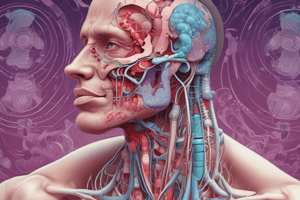Podcast
Questions and Answers
What is the cause of hyperthyroidism in Graves' disease?
What is the cause of hyperthyroidism in Graves' disease?
- Pituitary tumors
- Autoimmune origin (correct)
- Infection
- Thyroid cancer
What is a common symptom of hyperthyroidism?
What is a common symptom of hyperthyroidism?
- Weight gain
- Heat intolerance (correct)
- Decreased heart rate
- Cold intolerance
What is a potential complication of untreated arrhythmias in hyperthyroidism?
What is a potential complication of untreated arrhythmias in hyperthyroidism?
- Corneal ulceration
- Damage to the optic nerve
- Cardiac damage (correct)
- All of the above
What is a gastrointestinal symptom of hyperthyroidism?
What is a gastrointestinal symptom of hyperthyroidism?
What is a possible effect of hyperthyroidism on menstruation in women?
What is a possible effect of hyperthyroidism on menstruation in women?
Which symptom is commonly experienced by individuals with hyperthyroidism due to pressure from the thyroid gland?
Which symptom is commonly experienced by individuals with hyperthyroidism due to pressure from the thyroid gland?
What is a classic finding in Graves' disease?
What is a classic finding in Graves' disease?
What is the primary laboratory finding used to confirm the diagnosis of hyperthyroidism?
What is the primary laboratory finding used to confirm the diagnosis of hyperthyroidism?
What is the purpose of prescribing antithyroid agents in the treatment of hyperthyroidism?
What is the purpose of prescribing antithyroid agents in the treatment of hyperthyroidism?
What is the significance of assessing Total T3 and T4 levels in hyperthyroidism?
What is the significance of assessing Total T3 and T4 levels in hyperthyroidism?
What is the purpose of medical therapy in the treatment of hyperthyroidism?
What is the purpose of medical therapy in the treatment of hyperthyroidism?
What is the potential consequence of untreated hyperthyroidism?
What is the potential consequence of untreated hyperthyroidism?
What is the primary function of the thyroid gland?
What is the primary function of the thyroid gland?
What is the most common endocrine disorder, according to the text?
What is the most common endocrine disorder, according to the text?
What is the result of an overactive thyroid gland?
What is the result of an overactive thyroid gland?
What is the gender ratio of hyperthyroidism in the text?
What is the gender ratio of hyperthyroidism in the text?
What is the definition of hyperthyroidism?
What is the definition of hyperthyroidism?
What is the location of the thyroid gland in the body?
What is the location of the thyroid gland in the body?
Study Notes
Causes of Hyperthyroidism
- Graves' disease is the most common cause, also known as exophthalmic or toxic diffuse goiter.
- Exact cause of overactivity is unknown; possible factors include:
- Infection
- Physical or emotional stress
- Hormonal changes during puberty or pregnancy
- Autoimmune reaction where antibodies target TSH receptor cells
- Pituitary tumors
- Thyroid cancer
Signs and Symptoms
- Excess thyroid hormone accelerates metabolism, leading to:
- Increased excitability and overactivity
- Tremors that hinder eating
- Palpitations and tachycardia
- Arrhythmias potentially causing damage if untreated
- Elevated systolic blood pressure
- Heat intolerance, feeling excessively warm
- Weight loss due to rapid calorie burning
- Warm, moist skin
- Menstrual cessation in women
- Increased stool frequency and diarrhea due to reduced gastrointestinal transit time
- Bulging eyes (exophthalmos) common in Graves’ disease, risk for blindness
- Swollen neck causing hoarseness or swallowing difficulties
- Untreated hyperthyroidism can lead to intense nervousness, delirium, and death from cardiac overload
Diagnostic Studies
- Diagnosis confirmed by assessment of the thyroid gland, which is usually enlarged and may pulsate, accompanied by a palpable thrill and bruit over thyroid arteries.
- Key laboratory findings:
- Decreased TSH levels
- Elevated free thyroxine (free T4) levels
- Total T3 and T4 levels may be assessed for additional context, but free hormone is the biologically active form.
- Imaging studies such as CT or MRI may also be utilized.
Treatment Options
- Treatment can be either medical or surgical:
- Medications include antithyroid agents like propylthiouracil (PTU) or methimazole (Tapazole) that block thyroid hormone secretion; these may be used as pre-surgery preparation.
- Medications typically administered daily for an extended period.
Overview of Hyperthyroidism
- Defined as the overproduction of T3 and T4, leading to an increased metabolic rate.
- The thyroid gland, located in the lower neck, plays a critical role in energy metabolism and affects almost every organ.
- Hyperthyroidism is the second most prevalent endocrine disorder, following diabetes mellitus, and is more common in women (8 times more frequently than men).
Studying That Suits You
Use AI to generate personalized quizzes and flashcards to suit your learning preferences.
Description
Learn about the symptoms and diagnosis of hyperthyroidism, including enlarged thyroid gland, hoarseness, and cardiac overload. Discover the laboratory findings used to confirm the diagnosis.



